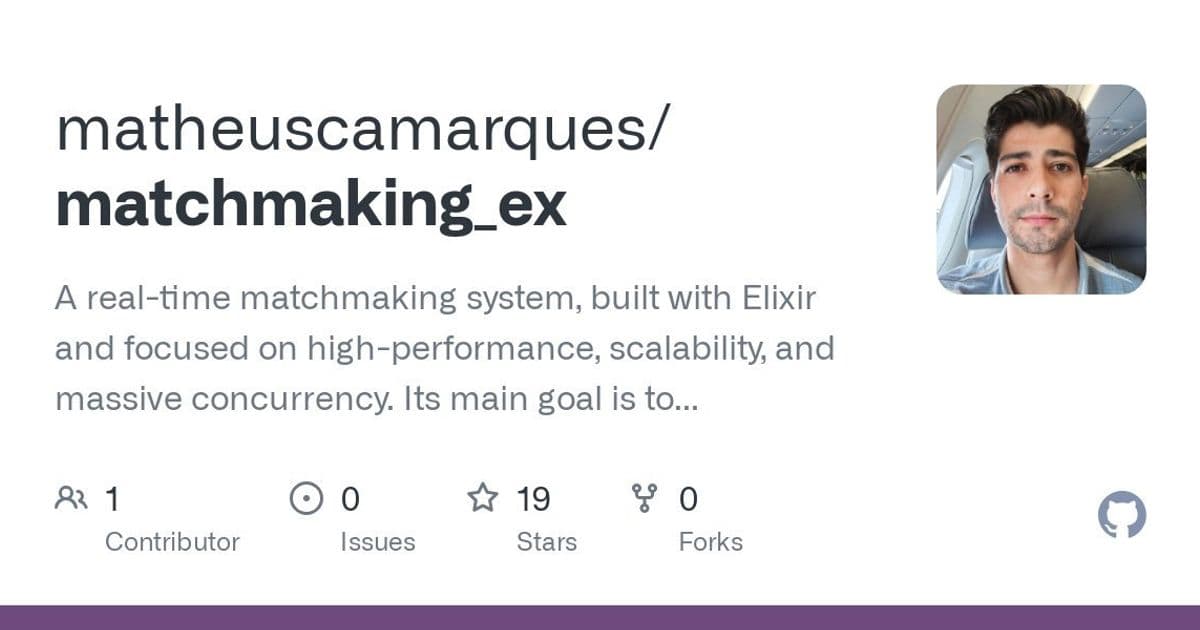MatchmakingEx delivers a battle-tested, fault-tolerant matchmaking system for Elixir applications, leveraging OTP principles to handle player coordination with two-way confirmations and intelligent failure recovery. This library simplifies complex workflows like ranked multiplayer matching while ensuring scalability through GenServers and DynamicSupervisors. Developers gain configurable filters, timeout management, and automatic re-queuing – critical for competitive gaming platforms.
Building real-time player matching systems demands more than simple queues: it requires atomic coordination, fault tolerance, and nuanced state management. Enter MatchmakingEx, an open-source Elixir library that transforms this complexity into a declarative, OTP-powered workflow. By harnessing Elixir’s concurrency primitives, it provides a scalable foundation for multiplayer games, dating apps, or any platform requiring real-time user pairing.
Why OTP Changes the Game
Traditional matchmaking often relies on centralized databases or external services, introducing latency and failure points. MatchmakingEx flips this model by embedding match logic directly into the BEAM VM using:
- GenServers: Dedicated stateful processes per player
- DynamicSupervisors: Isolated supervision for pending matches
- Registry: Atomic process discovery
This architecture ensures isolation – a crashed match doesn’t tank the entire system – while leveraging BEAM’s legendary fault tolerance.
The Two-Way Confirmation Workflow
MatchmakingEx’s core innovation lies in its state machine that enforces mutual consent. When players with compatible filters (e.g., %{rank: "diamond", mode: "2v2"}) are paired:
# Players initiate search
MatchmakingEx.Player.search("player_1", %{rank: "diamond"})
MatchmakingEx.Player.search("player_2", %{rank: "diamond"})
Both receive a :match_ready_for_confirmation message and a 15-second window to respond:
# Players explicitly accept/decline
MatchmakingEx.Player.accept("player_1")
MatchmakingEx.Player.decline("player_2")
The library’s state machine enforces critical rules:
- ✅ Match confirmed only if both accept
- ⏹️ Rejections trigger cooldowns (deterring bad-faith declines)
- ⏱️ Timeouts return accepting players to queue (no penalty for latency)
Fault Handling as a First-Class Citizen
MatchmakingEx anticipates real-world edge cases through its truth table logic:
| Player 1 | Player 2 | Outcome | Cooldowns | Re-queued |
|---|---|---|---|---|
| Accept | Accept | Confirmed | None | None |
| Accept | Timeout | Cancelled | None | Player 1 |
| Reject | Timeout | Rejected | Player 1 | None |
This granularity prevents unfair penalties – players aren’t punished for network blips, but strategic declines carry consequences.
Integration in 3 Steps
- Supervision Tree: Embed MatchmakingEx alongside your app’s core processes:
children = [
{Registry, keys: :unique, name: MatchmakingEx.Registry},
{DynamicSupervisor, strategy: :one_for_one, name: MatchmakingEx.PendingMatchSupervisor},
MatchmakingEx.Server
]
- Player Process Initialization: Spin up a process per user session:
{:ok, _pid} = MatchmakingEx.Player.start_link("user_id")
- Initiate Search: Trigger matchmaking with custom attributes:
MatchmakingEx.Player.search("user_id", %{region: "eu", min_rank: 5})
Why This Matters Beyond Gaming
While targeting multiplayer games, MatchmakingEx’s patterns apply to any coordination-sensitive domain:
- Marketplaces: Matching buyers/sellers with inventory filters
- Collaboration Tools: Pairing developers for live coding sessions
- IoT: Coordinating device clusters for distributed tasks
By abstracting state transitions and failure recovery into composable OTP behaviors, MatchmakingEx demonstrates how Elixir erases the boundary between "reliable" and "scalable." As real-time coordination becomes ubiquitous, such libraries prove that robust systems need not sacrifice ergonomics.
Source: MatchmakingEx GitHub Repository

Comments
Please log in or register to join the discussion